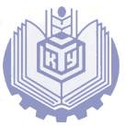Kuban State Technological University
 | |
| Type | State |
|---|---|
| Established | 16 June 1918 |
| Endowment | RUB 25.9 billion |
| President | Vladimir G. Lobanov |
Administrative staff | 1,300 |
| Undergraduates | 16,000 |
| Postgraduates | 800 |
| Location | Krasnodar, Kuban, Russia |
| Campus | Urban, 380 acres (1.5 km2) |
| Athletics | 43 varsity teams |
| Website | http://kubstu.ru/ |
Kuban State Technological University[1] (Russian: Кубанский государственный технологический университет), also referred to as the Kuban State University of Technology, located in Krasnodar, is one of the first higher educational institutions established in the southern region of Russia. It was founded on 16 June 1918 as North-Caucasian Polytechnic Institute. Professor Boris L.Rosing, a worldwide known physicist, the inventor of the electronic television, was one of the founders of the University.
History
Though it was a very difficult and unstable period in the history of Russia, the professors and lecturers made every effort to improve both the quality of education and research activities prompted by the needs of local food and beverage industries. This led to the development of two major disciplines of food science such as fats-and-oil and wine-making technology. By year 1940 the Krasnodar Institute of Food Technology was recognized as a leading higher educational institution in food sciences in the USSR.
Krasnodar Polytechnic Institute
In 1963 the Krasnodar Institute of Food Technology was re-structured into Krasnodar Polytechnic Institute with the introduction of several new programs. This led to increase in both of enrollment and academic faculties. On 11 April 1980 the institute was awarded the Order of the Red Banner of Labour.
Kuban State Technological University (KubSTU)
By the 1990s Krasnodar Polytechnic Institute developed into a leading higher educational institution in Russia. In November 1993 it obtained the status of a university, and as a result it was renamed to Kuban State Technological University (KubSTU).
Present day
Nowadays the KubSTU employs over 1200 full-time faculty, including professors and lecturers. The University enrolls over 16,000 undergraduate and about 800 postgraduate students. The University incorporates 4 institutes, 9 faculties, 74 departments, the institute of professional training and retraining, the KubSTU — Shneider-Electric training center, the center of high education, the Russian Minobrnauka regional centre of testing, a regional center of training specialists for Sochi Olympic Games, 6 research-training centers, 6 centres of high-tech equipment for collective use, 6 small-scale innovative enterprises, 4 student design offices, a student innovative business incubator, 450 specialized laboratories, 6 hostels, the Polytechnic sports centre, and 3 holiday camps at the seaside.[2] It also has branches in Novorossiysk and Armavir.
The University offers continuous multy-stage program, and trains students ranging from just post secondary level to undergraduate to graduate to the highest scientific level of PhD and DSc.
The University possesses good material-and-technical facilities. Classes are held in 11 buildings. At the area of 131 thousand m2 there are functioning 74 Departments, 115 lecture-rooms, 381 specialized laboratories and workshops, 60 computer classes. Special subjects are studied at 58 Department branches established at industrial enterprises of the Krasnodar City and Territory.
In three buildings for studies there are developed local computer networks used for teaching students, about 150 workstations have access to Internet. Total number of PC installed at KubSTU is over 1500.
University library
The University library has a rich stock of scientific, teaching and fiction literature – both domestic and international, over 1 million of volumes in number. The readers can work with literature in 9 reading halls and get books they need at 5 library departments. There is a local network and access to the Internet at the library, users can find information about literature in the electronic catalogue. The University has a unique library in the subjects of primary interest, including scientific books and textbooks, written by our scientists, proceedings of the KubSTU, dissertations defended at the University, rare and foreign journals and books.
State attestation and accreditation
The KubSTU has passed the state attestation and accreditation. According to the license KubSTU has the right to train specialists in 66 specialities, on 20 bachelor's degree programs and one master's degree program, to prepare postgraduate students for the PhD in 51 fields of science and for Doctor’s degree in 9 fields of science. The University offers also programs of pre-university training and optional programs.
Chancellor
The Rector of the University is Doctor of Technical Sciences, Professor Vladimir G. Lobanov.
Notes and references
External links
Coordinates: 45°02′55″N 39°00′09″E / 45.04861°N 39.00250°E